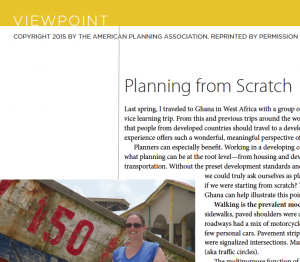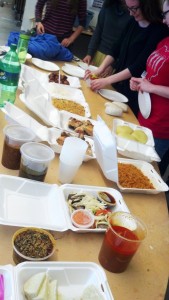Head over to the projects page to read the 2015 Ghana Sustainable Change Spring Studio  Final Projects and view the Final Presentations!!
Final Projects and view the Final Presentations!!
Posts
Spring Studio Final Presentations
Ghanaian Food Tasting in Studio
GSC in Planning Magazine
 Exciting news! Faculty leader Kim Burton has brought national attention to service learning in developing countries through an article published in the March 2015 issue of The American Planning Association’s Planning magazine.
Exciting news! Faculty leader Kim Burton has brought national attention to service learning in developing countries through an article published in the March 2015 issue of The American Planning Association’s Planning magazine.
“Last spring, I traveled to Ghana in West Africa with a group of Ohio State students for a service
learning trip. From this and previous trips around the world, I have reached the opinion
that people from developed countries should travel to a developing country at least once. The
experience offers such a wonderful, meaningful perspective of our own way of life.
Planners can especially benefit. Working in a developing country offers us a chance to see
what planning can be at the root level—from housing and development patterns to water and
transportation. Without the preset development standards and conditions we have in the U.S.,
we could truly ask ourselves as planners: What should be here
if we were starting from scratch? The transportation systems in
Ghana can help illustrate this point. . .” Read more
Spring Studio Underway
 The 2015 Ghana Sustainable Change Spring Studio class is underway! Project topics include:
The 2015 Ghana Sustainable Change Spring Studio class is underway! Project topics include:
- Sustainable Building Materials & Land Use Planning
- Water Access, Quality & Sanitation
- Stormwater & Drainage
- Transportation
- Training & Education
Look forward to updates featuring detailed information about the problems students are seeking to address after they narrow their focus with feedback from our Ghanaian partners here and abroad!
A Letter From Joe Campbell
 Next semester I will be stepping out of my co-leadership role with the Ghana Sustainable Change program. I am honored to have served this important
Next semester I will be stepping out of my co-leadership role with the Ghana Sustainable Change program. I am honored to have served this important
program over the last 14 months, assisting in grant writing, course planning and teaching as a Co-Instructor for the 2014 spring course and May study abroad program. The opportunity to work again with our partners from the Offinso North District
was the opportunity of a lifetime. I will remain in contact with our colleagues and friends in the OND through Facebook and WhatsApp as well as engaged in other projects in Ghana and West Africa through a separate venture outside of my work role at OSU. There is a great community of dedicated residents in Columbus supportive of sustainable
development in Ghana as well as an excellent network of GSC Alumni across the U.S. who I plan to remain in contact with. Many thanks to everyone who I worked with and for this incredible opportunity! I am available at campbell.844@osu.edu or +1614-634-6363 if ever needed.
Meda ase, Joe Kwame Campbell
Project: Water Quality 2014
 Karmyn Schneider and Bob Campbell (Public Health) teamed with Danny Berghoff (Geographic Information Systems) and ONDA Sanitation and Environment Director Fuseini Munumi and NSP member Frederick Van de Panisha to augment work started by the GSC in 2011 to identify boreholes (water wells), map their location and test the quality of the water for bacteria and other pollutants. Team members will continue to work remotely with Mr. Munumi, sending testing equipment and assisting in data management, as he expands upon their data collection and analysis methodology over the summer and into next year. In collaboration with Mr. Munumi, the students have identified significant potential areas for future public health research and intervention.
Karmyn Schneider and Bob Campbell (Public Health) teamed with Danny Berghoff (Geographic Information Systems) and ONDA Sanitation and Environment Director Fuseini Munumi and NSP member Frederick Van de Panisha to augment work started by the GSC in 2011 to identify boreholes (water wells), map their location and test the quality of the water for bacteria and other pollutants. Team members will continue to work remotely with Mr. Munumi, sending testing equipment and assisting in data management, as he expands upon their data collection and analysis methodology over the summer and into next year. In collaboration with Mr. Munumi, the students have identified significant potential areas for future public health research and intervention.
Project: Biogas 2014
 Adam Sauer (Electrical Engineering) and Natalie McClaine (Environmental Sciences) continued work began in 2011, and expanded in 2012 by Adam and local electrician Augustine Yeboah, to explore the use of “biogas” –naturally occurring methane gas created through decomposing food scraps, animal and human waste, among other organic products— as an alternative cooking fuel source for homes in the district. The biogas team sought to source local materials and to improve designs to increase cost effectiveness. After realizing the difficulties of many subsistence farmers to (1) make the initial investment for the necessary materials, and (2) to properly maintain the correct chemical and bacterial levels in small scale digesters, Adam and Natalie recommend that a larger biogas facility operated by a trained team would be the best option for sustainable development, and have found several organizations in-country that are currently working on similar goals.
Adam Sauer (Electrical Engineering) and Natalie McClaine (Environmental Sciences) continued work began in 2011, and expanded in 2012 by Adam and local electrician Augustine Yeboah, to explore the use of “biogas” –naturally occurring methane gas created through decomposing food scraps, animal and human waste, among other organic products— as an alternative cooking fuel source for homes in the district. The biogas team sought to source local materials and to improve designs to increase cost effectiveness. After realizing the difficulties of many subsistence farmers to (1) make the initial investment for the necessary materials, and (2) to properly maintain the correct chemical and bacterial levels in small scale digesters, Adam and Natalie recommend that a larger biogas facility operated by a trained team would be the best option for sustainable development, and have found several organizations in-country that are currently working on similar goals.
Check out a video Adam made about Ghana Sustainable Change and the Biogas Project here
Project: Soccer 2014
Nathan Cotton (Neuroscience) also worked with Kwabena Kokroko and other youth soccer coordinators in the district to distribute soccer equipment donated by the Columbus Crew and the OSU Men’s Soccer Club to high school and youth soccer programs in the district. Nathan also worked with local soccer coaches to map the location of soccer fields in the district to assist them in coordinating their soccer games for the creation of a district-wide league. Nathan is developing a marketing proposal to help raise funds for the league’s creation.
2015 Program Information

Ghana Sustainable Change is excited to announce to you our spring plan for 2015:
The program will hold its Spring Semester 2015 studio class this year to develop and continue work on projects for implementation in the Offinso North District of Ghana. The upcoming class will be a mixture of City and Regional Planning graduate and undergraduate students.
Due to a number of combined circumstances, the travel section of our program has been rescheduled to spring break 2016. Students involved in the 2015 studio class will be encouraged to join the spring 2016 trip to Ghana. They will also have the option to enroll in the 2016 spring studio class to continue work on their projects.
A new spring studio component in 2016 will allow students from other disciplines to join the class as an independent study or as an abbreviated workshop. This will allow interdisciplinary collaboration without constraining students outside of CRP to six credit hours of CRP credit. We believe this combination will be the best of all worlds: incentivizing interdisciplinary collaboration by being sensitive to the busy academic schedules of potential students, and ensuring a strong foundation of the program in City and Regional planning by formulating the class as a studio course for CRP students.
We have more announcements on the horizon, look for a winter newsletter near the first of the year!
Most importantly, we thank you for your interest, support, and participation in the Ghana Sustainable Change program and mission.




